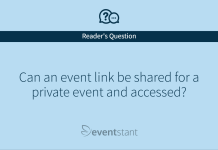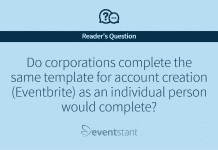 Photograph by Alexandre Miguel Da Silva NunesMany event planners cause themselves unnecessary stress by not preparing as fully as they should for any and all eventualities. The one universal consistency from one planned event to another is that invariably something will go wrong. Prepared event professionals always plan for contingencies and mishaps and are ready when something happens, all while doing everything they can to assure the best possible event outcome. The preparedness helps eliminate unnecessary headache during the event when you should engage attendees, not worry.
Photograph by Alexandre Miguel Da Silva NunesMany event planners cause themselves unnecessary stress by not preparing as fully as they should for any and all eventualities. The one universal consistency from one planned event to another is that invariably something will go wrong. Prepared event professionals always plan for contingencies and mishaps and are ready when something happens, all while doing everything they can to assure the best possible event outcome. The preparedness helps eliminate unnecessary headache during the event when you should engage attendees, not worry.
Contingencies, Delegating, & Micromanagement
Recently, while coordinating a convention for about 300 people in San Diego, I became famous with the hotel staff for my insistence on always being prepared. The hotel staff, rather than being perturbed or bothered by my insistence on contingency planning, presented me with a gift of a lovely pewter flask, and inscribed “The Ultimate Backup Plan.”
One of the major errors made by many event planners is expecting others to do everything they promise to do, and thus over depending on this. I've often been told by others that they believe in delegating and don't believe in micromanagement, and that it's necessary to delegate to others. While I fully believe in delegating, I don't believe it's prudent to delegate to individuals you're not certain are capable, experienced and possess the necessary expertise required for the successful completion of the task. In terms of the micromanagement issue, it's lack of proper management if one does not demand reports and follow through of anything assigned. Too many leaders seem to prefer to have the “out” of placing blame, which is perhaps the most futile and inefficient of activities as well as being demotivating.
Take a “Timeout”
When planning an event, however, organizers and planners have to insure against “burnout” because they over commit or don't dedicate enough time for “downtime” to relax and step away. Most event coordinators would work better as a two- or three-person team, so that one person can assist the other with the needed tasks. Short periods devoted to relaxation, such as listening to music, exercising, taking a walk alone away from the event, etc., are extremely useful to reduce stress.
However, undoubtedly the best method to avoid stress is to be very well prepared. Don't leave details to the last minute. Get everything done well in advance. Secure all agreements in writing, because, especially in the hotel business, there is a large degree of turnover and written protection saves much aggravation.
Organizations employing professional event organizers would be smart to permit the professional to do all the negotiating (the organization should provide parameters and guidelines, though) from the beginning. Effective negotiations know that the use of Request for Proposals (or RFPs) go a long way to easing the process of negotiating the best possible scenario and terms.









![How Important Are Face to Face Meetings [INFOGRAPHIC]](https://eventstant.com/wp-content/uploads/faceToface_v11-sm-218x150.jpg)










[…] You can start by reading this Vitorix.com article, written by planning professional Richard Brody: Stress Relief for Event Planners. A few keywords every planner must live by: contingency plan, delegate, prioritize, […]